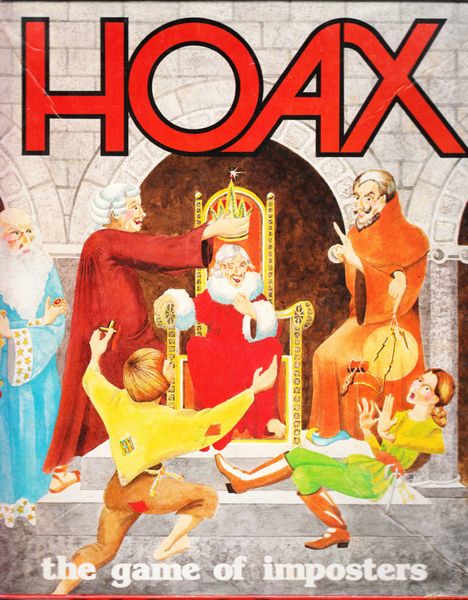Hoax is a board game that was first released in 1981 by Eon. It was designed by Bill Eberle, Edward Horn, Jr., Jack Kittredge, and Peter Olotka and features artwork by Linda Bound. The game falls under the categories of bluffing, deduction, fantasy, and medieval themes.
Game Components of Hoax
Character Cards: Each player receives a random character card with a secret identity.Resource Tokens: Cash, Prestige, and Evidence tokens.Suspicion Cards: Used for investigations.Impostor Tokens: Mark characters a player cannot claim.Game Board: Not explicitly mentioned, but likely included for resource tracking and player actions.
How To Setup Hoax
Setup involves each player receiving a random character card, which they keep secret. This card determines their identity and role in the game. Each player starts with no resources, and the suspicion deck is prepared for investigations.
Gameplay Mechanics and Game Objective
Claim Action: Players claim to be a character and use that character’s ability to gain resources (Cash, Prestige, or Evidence).Investigate Action: Players spend resources to investigate another player, forcing the target to reveal their identity card along with three random cards.Accuse Action: Players can accuse another player of lying, potentially eliminating them from the game if correct.Call Hoax: Other players can call “hoax” when someone claims an identity, leading to a vote that can restrict the accused player’s future actions.Game Objective: The goal is to eliminate other players by uncovering their secret identities and be the last player standing or the first to gain the necessary resources to win.
Player Experience
Hoax is designed for a fun, quick play session, making it ideal for parties or casual game nights. The game requires strategic thinking and social interaction as players must bluff and deduce to uncover other players’ identities.
Pros
Fast Gameplay: Games typically last under 30 minutes.Social Interaction: Encourages bluffing, lying, and social deduction.Light and Frothy: Easy to learn and play, suitable for a light gaming experience.Party Game: Ideal for groups of friends looking for a fun, interactive game.
Cons
Memory Dependency: Requires good short-term memory to track investigations and claims.High Risk of Elimination: Misjudging an accusation can lead to immediate elimination.Voting Mechanism: The call hoax mechanism can sometimes feel arbitrary if the majority vote does not align with the truth.
Personal Thoughts on Hoax
Hoax is perfect for a group of friends who enjoy social deduction games and are good at bluffing and lying. It’s an excellent choice for parties or casual game nights due to its quick gameplay and light, fun atmosphere. However, it may not be ideal for those with poor short-term memory or those seeking a more complex, strategic game.
We are supported by our audience. When you purchase through links on our site, we may earn an affiliate commission, at no extra cost for you. Learn more.

